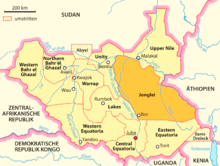Officials in Greater Pibor Administrative Area (GPAA) and their Jonglei State counterparts have reiterated their commitment to restoring peace and security in the troubled region.
The calls were made at the end of Sunday’s retreat by the Jonglei State officials in GPAA capital, Pibor town.
“On Sunday, a delegation led by acting governor Jacob Akec was in Pibor. The dry season is coming with a lot of issues like cattle raids and child abduction,” Jonglei State Information minister John Samuel Manyuon said. “So, in the visit, we agreed to the formation of joint forces to patrol the area, creating a common market for cattle auctioning, and that criminals from both sides shall be dealt with jointly as criminals without implicating the community.”
The state information minister expressed optimism that they are going o realize peace because implementation strategies will change.
“Resolutions are not different but ways of implementation will change. For this, we are going to take it practically to the youth in the villages. We will reach out to the grassroots where Lou Nuer, Murle, and Dinka youth are in the dry season. Again, we are going traditionally not by signing papers in the town. These youth are going to perform rituals,” he said.
Peter Simon Ajeny, the GPAA local government and law enforcement agencies minister, said they hoped Sunday’s retreat will restore security.
“After receiving the Jonglei State officials, we had a meeting, and then invited our youth and held a peace rally. We hope the resolution on issues of cattle raids, child abduction, and a common market will lead to the reopening of the Juba-Pibor and Bor-Pibor roads which will enable us to receive goods,” he said.
For his part, Ter Manyang, the executive director of the civil society organization Center for Peace and Advocacy (CPA), lauded the Jonglei State and GPAA for recommitting to peace.
“This is a good move if there are such initative in Greater Jonglei to bring peace to the community and will boost confidence among leaders and their citizens. However, the process should be inclusive. MPs should have been involved because they are too close to citizens,” he said.




